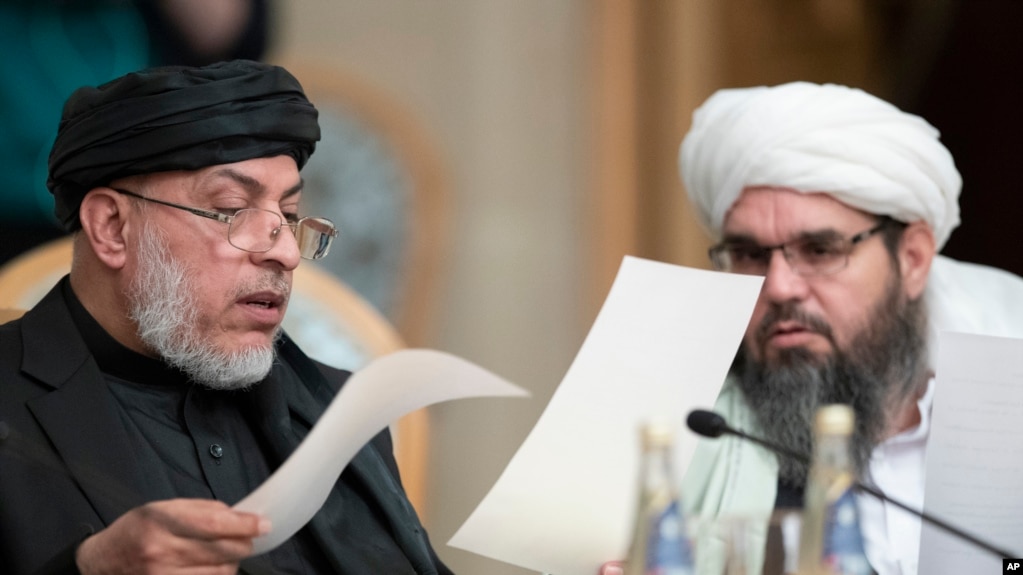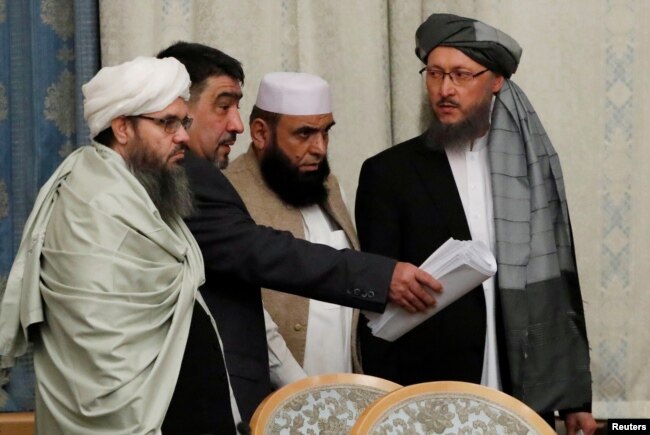Ayaz Gul
 ISLAMABAD — Taliban representatives will meet influential Afghan opposition leaders in Moscow for two days of peace building discussions starting Tuesday, but envoys from the Kabul government will not be in attendance.
ISLAMABAD — Taliban representatives will meet influential Afghan opposition leaders in Moscow for two days of peace building discussions starting Tuesday, but envoys from the Kabul government will not be in attendance.The controversial meeting, critics say, underscores a deepening political divide in Afghanistan and would further weaken President Ashraf Ghani’s National Unity government.
The so-called “intra-Afghan peace meeting” in Russia comes just days after the United States reported “significant” progress in ongoing talks with Taliban insurgents, though they also excluded the Afghan government.
The Taliban refuses to engage in direct or indirect talks with the Ghani administration, branding them American “puppets.”
A Taliban spokesman has confirmed to VOA a delegation from its Qatar-based “political office” will participate in the Moscow talks under the leadership of senior insurgent negotiator, Sher Mohammad Abbas Stanekzai.
Spokesman Zabihullah Mujahid in a statement Monday said his his group intends use the Moscow conference to open channels to reach an understanding with political groups outside the Afghan government.
“The Islamic Emirate (Taliban) wants to appropriately utilize this opportunity to clarify its Shariah-based and ethical stance to various parties and explain its policy and mechanism about future Afghanistan vis-à-vis end of (U.S.) occupation, enduring peace in homeland and establishment of an intra-Afghan Islamic system of governance,” Mujahid explained.
Russia has distanced itself from the upcoming meeting after criticism from the Afghan government. Critics suggested the disputed Afghan talks could have stemmed from Moscow’s deepening rivalry with Washington.
But the Russian embassy in Kabul has clarified in a statement that the meeting is being arranged by a Russia-based “Council of Afghans Society” to promote peace in Afghanistan.
 FILE - Members of Taliban delegation take their seats during the multilateral peace talks on Afghanistan in Moscow, Nov. 9, 2018.
FILE - Members of Taliban delegation take their seats during the multilateral peace talks on Afghanistan in Moscow, Nov. 9, 2018.A 38-member Afghan political delegation, including several women, consists of prominent former leaders, presidential candidates, lawmakers, tribal elders, all of them highly critical of Ghani’s beleaguered National Unity government.
Former president, Hamid Karzai, former national security adviser, Haneef Atmar — who is running against Ghani in the July presidential elections — Mohammad Mohaqiq, former governors Mohammad Ismail Khan and Atta Mohammad Noor, who fought against the Soviets after their 1979 invasion of Afghanistan are part of the delegation.
A joint statement issued on behalf of the Afghan delegation described Tuesday’s meeting in Russia as “the first step towards intra-Afghan peace talks” in the peace process.
“We hope that the Moscow meeting will prove helpful and complementary for encouraging a national and regional consensus and for supporting the U.S. efforts for Afghan peace,” the statement noted. It urged the Afghan government to play “its constructive role” for achieving a sustainable peace in the country.
“Holding such meetings will not help us in reaching peace at all, so it’s little more than a political drama,” Afghan Foreign Ministry spokesman Sebghat Ahmadi told reporters in Kabul when asked for his reaction to the Moscow talks.
A statement from Ghani's office charged that Afghan politicians attending the gathering were doing so "in order to gain power." Ghani's chief adviser, Fazel Fazly, tweeted that it was "regrettable."
U.S. special envoy for Afghanistan reconciliation, Zalmay Khalilzad, and Taliban negotiators are due to hold another round of peace talks in Doha on February 25.
At the end of their six days of uninterrupted talks in the Qatari capital last month, Khalilzad and chief Taliban negotiator Stanekzai, in separate statements announced they are close to a deal on a U.S. troop withdrawal from Afghanistan in exchange for assurances from the Taliban they will not to allow terrorists to use Afghan soil for future attacks against America and its allies.
But Khalilzad has underscored the need for a comprehensive cease-fire and the Taliban’s engagement in intra-Afghan national peace negotiations for further progress.
